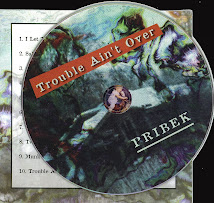Essay by Pat Darnell | July 11, 2013 | Bryan TX
[Picture LINK]
Hidden under its hood is a predator; not human or animal but a rapacious, and exploitative, condition. Living with this condition proves to be venturesome, often perilous. Experts tell us that the condition is passed on by hereditary processes. If you see it in your family, chances are that it is with you as well.
Bipolar disorder has a way of staying close to home. It is a mental condition that escapes detection by the uninitiated. Symptoms often resemble exuberance during the manic stages of bipolar episodes, and resemble seasonal blues on the depression side of the disorder. Thus the reason for the "bi" in bipolar, two opposite conditions vie for your attention.
Racing thoughts, tendency to over-indulge, decreased need for sleep, increased drive to perform or achieve goals, and risky behavior, may seem like a list of qualities of highly successful people. Yet these too are basic symptoms of hypomania.
Sadness, hopelessness, suicidal thoughts and behavior, anxiety, guilt and fatigue, with loss of interest in activities once considered enjoyable are symptoms that announce the depressive phase of one being bipolar. Haunting, yes, -- unknowable, no.
At some point in the life of bipolar persons there is a great questioning: "Why aren't I progressing like others?" and "Something must be wrong with me." Situations like finding and keeping a relationship, or, becoming obsessed with another person's life until you smother the person, can lead to this great moment of self-questioning. If the bipolar person seeks help at this point, he might be diagnosed with straight up schizophrenia, or borderline personality disorder, or one of three bipolar conditions, showing the great range of this condition. Most of the time one is asked what drugs she takes, what kind of self-med's are you taking. Such misdiagnoses can lead to more confusion.
One person describes her realization phase this way:
" ... My illness was insidious, gradual and inexorable. I had a preview of depression in high school, ... The hormonal chaos of having three children in five years, the pressure of working on a Ph.D. dissertation and a genetic predisposition for a mood disorder took me to a place of darkness I hadn't experienced before. Of course, I didn't recognize that right away. Denial is a gauze; willful denial, an opiate. Everyone seemed in league with my delusion. I was just overwhelmed, my family would say. I should get more help with the kids, put off my Ph.D. (LINDA LOGAN. Published: April 26, 2013. LINK ) ... "Your friends and lovers who adore you because you are unique, are going to go along with your mood swings. They will protest when you say you want to kill yourself. Most will recognize and love your balls to the wall attitude about life during manic phases, but the same will fail to recognize the times you are alone, curled up with racing thoughts, and unable to move in your depressed phases.
Bipolar people who harness their energy when they are in a hypomanic phase can be really productive. But, the most dangerous attitude is denial: denying that you actually have a severe reaction to life situations, not recognizing your ups and downs, is very often fatal.
Long term denial can lead to destruction. Family members who have not recognized bipolar conditions in themselves can actually destroy one another. Each family member thinks from his own point of view and holds tight to his belief that he is right, and the others are thinking wrong. With no real give and take communication the family is torn apart.
Bipolar "unrecognized," and untreated, and denied is the worse case condition. Bipolar "recognized" allows the sufferer to begin channeling all that energy, because "Bipolar is Energy." Imagine the things you could accomplish if you channeled all the bipolar energy into finishing all your projects! There is beauty in knowing.
_____________________________Reference
http://www.urbandictionary.com/define.php?term=bipolar
http://www.nytimes.com/2013/04/28/magazine/the-problem-with-how-we-treat-bipolar-disorder.html?pagewanted=all&_r=0
http://www.helpguide.org/mental/bipolar_disorder_symptoms_treatment.htm
http://www.health.com/health/gallery/0,,20436786,00.html
https://store.mayoclinic.com/products/books/details.cfm?mpid=46&trkid=21242S128003910
http://www.mayoclinic.com/health/bipolar-disorder/DS00356/DSECTION=symptoms






No comments:
Post a Comment